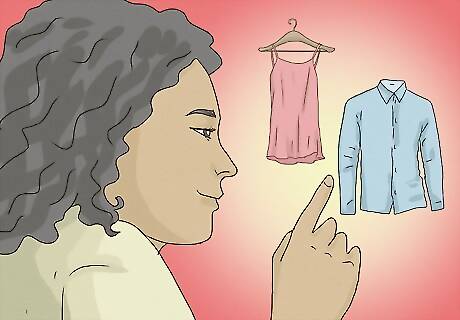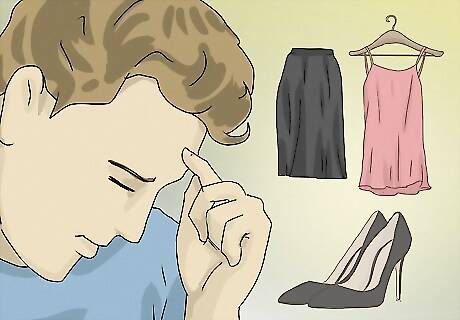
views
- Crossdressing is completely harmless and if you want to continue crossdressing, it’s totally okay.
- If you do want to quit, focus on other hobbies, stay busy, and give away any crossdressing clothes to avoid the temptation.
- Resist the urge to feel bad about not conforming to traditional gender norms. There’s nothing wrong with who you are.
How to Stop Crossdressing

Pour your passions into something else you care about. This is especially productive if you’re crossdressing as a way to express yourself or combat gender norms. You may discover other outlets for your creativity, such as painting, writing, or baking. Others may enjoy playing an instrument, going for a walk, working out, or other activities. Finding another hobby to do will help to divert your attention away from crossdressing and provide you with something to do. Whenever possible, choose social hobbies, like chess, basketball, book clubs, or community gardening. This way, you’ll surround yourself with other people, which should help insulate you from the urge to crossdress.

Give your clothes away or make them hard to access. Hide or donate the clothes you used to wear when you crossdressed. You will be less likely to crossdress if you hide your clothes (out of sight out of mind). Put your clothing in a garbage bag and store it somewhere out of the way. You could also donate your clothes to be worn by others. If you have any feeling like you may want to crossdress in the future, don’t donate or throw away your clothes.

Make yourself too busy to have time for crossdressing. Exercise more often. Dedicate yourself to volunteering twice as often as you currently do. Sign up for those after-school or after-work activities. The more active and engaged you can get in your free time, the less time you’ll have to sit around thinking about crossdressing. You’ll also feel better if you’re more active!

Try crossdressing less often as a middle ground. Nobody says you have to quit crossdressing entirely. If this is becoming a bit of a big time sink for you, maybe just try to keep it to one day a week or something like that. Cutting back by 50-75% can really improve your headspace without laying down the pressure to stop crossdressing entirely.
Reflecting and Taking an Emotional Inventory

Identify why you’re crossdressing in the first place. Crossdressing is sort of like getting exercise in the sense that everybody has different motivations for doing it. Think about how you feel when you’re wearing the opposite sex’s clothes and meditate on what your primary motivation is. It could be that you get one of the following out of crossdressing: Exploration and expression of self. Perhaps you’re just articulating something about yourself by crossdressing, or maybe blurring the gender lines is interesting to you. Sexual thrill. Some, but not all, of the people who crossdress get a sexual kick out of the “taboo” of crossdressing and enjoy the inversion of gender roles. Personal comfort. Look, a lot of men’s and women’s clothes aren’t particularly comfy, so if you enjoy wearing the opposite gender’s clothes at home, maybe it’s just a comfort thing. It’s fashionable. This applies mainly to men who get stuck with boring suits, T-shirts, and flannels most of the time. Women just have so many cooler options! If you’re a fashionista, crossdressing just makes sense.

Keep being yourself and ignore the haters. There is absolutely nothing wrong with dressing however you want—and for whatever reason. Clothes are fundamentally not harmful, and you can wear whatever you want whenever you want. Society has a way of making people who don’t follow every single social and gender norm feel bad, but don’t let that impact your choices in life. It’s totally normal to feel a little anxious or nervous about violating a social “rule” like gender, so don’t feel bad if you’re a little bummed out. All of this is okay.

Know that what you wear is not your sexuality. There are plenty of guys out there who enjoy crossdressing and are exclusively attracted to women. There are also plenty of women out there who enjoy dressing as men and are attracted to them, too. Basically, every kind of attraction exists with crossdressing, so don’t treat your crossdressing as something that it isn’t. This isn’t to say that you can’t crossdress and identify as LGBTQ+, just that it’s not a hard and fast rule. There isn’t necessarily a big connection there. If you’re worried about your partner judging you or putting you down for crossdressing, it’s a sign that they aren’t mature enough for the relationship to begin with.

Avoid judging what all of this “means” in the end. Maybe this is a sign that you’re trans and maybe it’s not. Maybe crossdressing is a sexual thing for you, and maybe not. Either way, there’s no benefit to rushing to judgment. It’s totally okay to feel a little confused or mixed up about this, and it can take time to sort out complicated feelings. Don’t rush it—you’d be robbing yourself of valuable self-discovery. You’ll answer all of these questions in due time as you get older and develop a more complex or comprehensive understanding of yourself.

Realize the urge to crossdress may never go away. And that’s okay! Even if you quit, so what if you have the occasional urge to wear different kinds of clothes? You can just ignore it and move on—even if it’s a little uncomfortable for a minute. The point is, people have impulses to do all kinds of stuff, and that doesn’t mean they have to follow them. Think about married couples. You think each person in a marriage never finds someone else attractive? They do—all the time, in fact!—they just don’t act on it. If you find the urges to crossdress impossible to ignore because they make you depressed or uncomfortable, you may be transgender.
Getting Help

Talk to other crossdressers online about quitting. Crossdressing is an extremely common behavior. It’s as old as Shakespeare, after all. Find a message board or forum where other people are coping with or discussing their urges to crossdress and reach out for help. Just make sure you stick to all-ages forums if you’re under 18. Reddit’s r/crossdressing and r/lgbt are great resources if you have questions. Empty Closets is a forum dedicatedly entirely to people who may be gender non-conforming or LGBTQ+, so it’s a great option. The upside of talking to folks online is that it’s anonymous, so you don’t need to worry about being judged.

See a therapist if you want professional support and help. Issues surrounding gender are so common that there are entire schools of psychology and therapy dedicated to them. Seeing a professional therapist can give you the safe space you need to express how you feel, process your feelings, and cope with any uncomfortable or messy emotions you have. You can find a therapist who specializes in gender issues near you by searching at Psychology Today.

Talk to an open-minded and trustworthy friend. If you feel safe, just talk to a friend of yours about what you’ve been experiencing. Maybe they’ll help you fight the urges to crossdress by providing an emergency point of contact, or perhaps they’ll keep your clothes safe while you figure it out. But even if they don’t, it will help to express yourself with someone who knows you—even if they’re just a sounding board who helps you sort things out on your own. If you have parents or family members who are really warm and open about gender performance, you can talk to them instead. It’s totally okay to avoid talking to your parents if you don’t think they’ll react in a loving way, though.



















Comments
0 comment